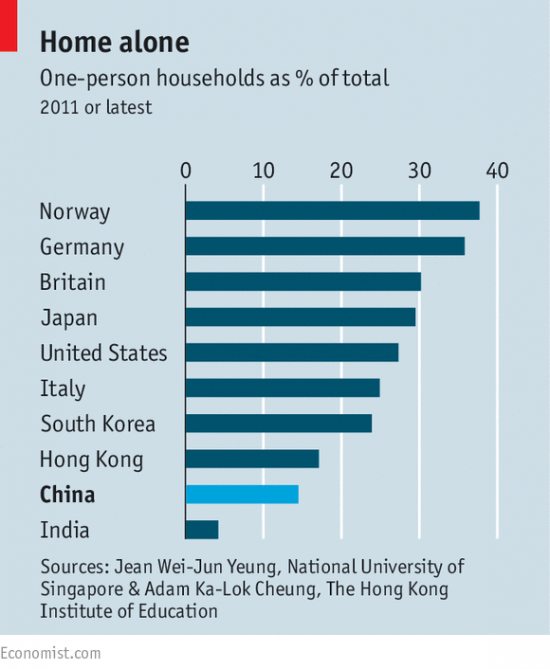In many countries around the world, especially Europe and America, children are expected to move out of the family home after reaching legal adulthood. Therefore, it’s no surprise to find young, single adults living alone, either in a rented or (for the more affluent) own property, pursuing their education or careers.
Unlike in Western countries, Chinese culture dictates that families should live together, until such time when a member gets married to start their own family. Even then, it largely depends on whether the one getting married is a son or daughter – the son’s family will have an additional member to the household, while daughters are expected to live with their husband’s family (if the couple do not have their own house). Choosing to live alone and unmarried is often frowned upon in Chinese society, yet more and more young singles in China choose to live alone.
In the decade to 2010, the number of single-person households doubled. Today, over 58 million Chinese live by themselves, according to census data, a bigger number of one-person homes than in America, Britain and France combined. Solo dwellers make up 14% of all households.
Yet for the most part younger Chinese living alone are from among the better-off. Young singles living by themselves in China’s big cities usually come from wealthy families or are high-income earners who are capable of renting an apartment or buying a house of their own, adding to the number of single-person households. China’s home prices rose in August in half of the 70 cities monitored by the government, spurred by easing of home-purchase restrictions and interest-rate cuts, even as the economy slowed and share markets plunged. Buying demand in large cities is expected to remain strong as interest rates at historical lows will reduce home-buying costs.
For some, living alone is a transitional stage on the way to marriage, remarriage or family reunification. But for a growing number of people it may be a permanent state. In cities, many educated, urban women stay single, often as a positive choice — a sign of rising status and better employment opportunities. The better-educated under-30-year-olds are, and the more money they have, the more likely they are to live alone. Rich parts of China have more non-widowed single dwellers: in Beijing a fifth of homes house only one person.
Freedom and new wealth have started to break down China’s traditional family structures. Living alone no longer means living in solitude, as technology makes it easier to connect with family and friends, as well as make new acquaintances. Living away from strict family constraints also opens up space for new social networks, interest groups and differing political views from their parents.

Nevertheless, a study found that people who live alone are more likely to suffer from poor nutrition, by eating less fruits and vegetables and more pre-cooked meals. (Image from Medical Daily)
China recently announced the end of its one-child policy, but it may be a case of ‘too little too late’. Not only did it leave China with a skewed gender ratio in which men outnumber women – a consequence of preferring sons over daughters – the policy also created a demographic imbalance that will leave the country with a smaller work force and more older citizens to care for in the coming decades, a situation currently faced by Japan due to low fertility rates.
I would like to add that the catchy song “Sexy, Free & Single” by Korean boyband Super Junior has been playing in my head this entire time. Rather apt, don’t you think?
Source
Bloomberg, ‘China Home-Price Growth Widens to More Cities Amid Rate Cuts’ (link)
CNBC, ‘Why China’s child policy may not matter’ (link)
The Economist, ‘Young, single and what about it?’ (link)






